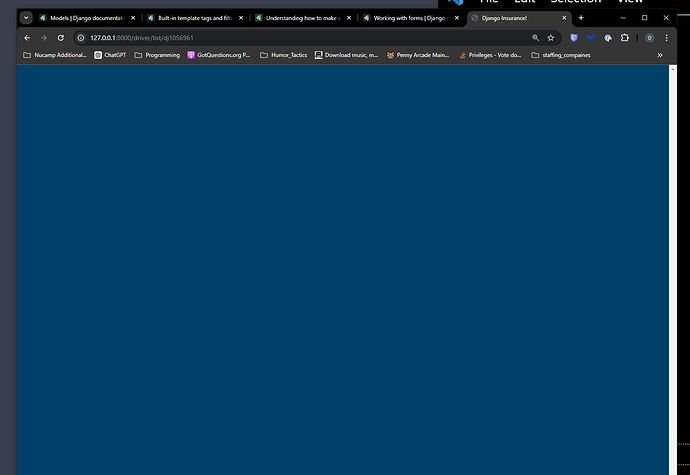I have created a template, driver-list.html, which extends from base.html. When my next button is clicked it is supposed to load driver-list.html but it does not appear. Why is this? What can I do about it?
# django_insurance/quote/urls.py
from django.urls import path
from quote.views import (
AboutPageView,
Customer_CreateView,
HomePageView,
DriverListView,
driver_form,
vehicle_form_view
)
urlpatterns = [
path("quote/customer/create/", Customer_CreateView.as_view(), name='customer'),
path("about/", AboutPageView.as_view(), name="about"),
path("driver/list/<str:quote_id>", DriverListView.as_view(), name="driver_list"),
path("driver/", driver_form, name="driver"),
path("vehicle/", vehicle_form_view, name="vehicle"),
path("", HomePageView.as_view(), name='home'),
]
<!-- base.html -->
{% load static %}
<!DOCTYPE html>
<html class="theme-dark">
<head>
<title>Django Insurance!</title>
<meta name="viewport" content="width=device-width, initial-scale=1" />
<link rel="stylesheet" href="{% static 'css/bulma.min.css' %}" />
<link rel="stylesheet" href="{% static 'css/base.css' %}" />
</head>
<body>
<section class="section">
<h1 class="title">{{ title }}</h1>
<h2 class="subtitle">
{% block page_content %} {% endblock page_content%}
</h2>
</section>
</body>
</html>
<!-- driver-list html -->
{% extends "base.html" %}
{% block list_content %}
<p>Your quote id is: {{ quote_id }}</p>
{% endblock list_content %}
# quote/views.py
from typing import Any
from django.shortcuts import redirect, render
from django.http import HttpRequest
from django.views.generic.edit import CreateView
from django.views.generic import TemplateView
from quote.forms import DriverForm, VehicleForm
from quote import models
from django.views.generic.list import ListView
import random
# need to import views in the urls.py of quote
class Customer_CreateView(CreateView):
quote_id: str = None
model = models.Customer
fields = [
"first_name",
"last_name",
"address",
"telephone_number",
"zip_code",
"email_address",
"date_of_birth",
"home_ownership"
]
template_name = "customer.html"
def form_valid(self, form):
form.instance.quote_id = self.quote_id
return super().form_valid(form)
def get_success_url(self):
return f"/driver/list/{self.quote_id}"
# we need to utilize the setup() function in createview. we need to add functionality
# to setup to create a quote_id for django to know that this quote is for this customer.
def render_to_response(self, context, **response_kwargs):
response = super().render_to_response(context, **response_kwargs)
response.set_cookie('quote_id', self.quote_id, max_age=3600)
return response
def setup(self, request: HttpRequest, *args: Any, **kwargs: Any) -> None:
current_quote_id = request.COOKIES.get('quote_id', '')
print(f'current_quote_id: {current_quote_id}')
if not self.quote_id and not current_quote_id:
self.quote_id = create_quote_id()
print(f'setting up quote id: {self.quote_id}')
else:
print(f'setting to current_quote_id: {current_quote_id}')
self.quote_id = current_quote_id
return super().setup(request, *args, **kwargs)
# each view has its own context
# in order to change context in django we need the get_context function
def get_context_data(self, **kwargs):
context = super().get_context_data(**kwargs)
context['quote_id'] = self.quote_id
context['title'] = "Customer Page"
return context
# class Customer_UpdateView(UpdateView):
# model = models.Customer
# fields = [
# "first_name",
# "last_name",
# "address",
# "zip_code",
# "telephone_number",
# "email_address",
# "date_of_birth",
# "home_ownership",
# ]
# template_name_suffix = "_update_form"
# template_name = "customer.html"
# def get_success_url(self):
# return f"/driver"
class HomePageView(TemplateView):
template_name = "home.html"
def get_context_data(self, **kwargs):
context = super().get_context_data(**kwargs)
context['title'] = "Home Page"
context['description'] = "We provide the best services."
return context
class AboutPageView(TemplateView):
template_name = "about.html"
class DriverListView(ListView):
template_name = 'driver-list.html'
model = models.Driver
def setup(self, request: HttpRequest, *args: Any, **kwargs: Any) -> None:
self.quote_id = kwargs['quote_id']
return super().setup(request, *args, **kwargs)
def get_context_data(self, **kwargs: Any) -> dict[str, Any]:
context = super().get_context_data(**kwargs)
context['quote_id'] = self.quote_id
return context
def vehicle_form_view(request):
quote_id = request.COOKIES.get('quote_id')
# TODO handle post request to validate and save data.
form = VehicleForm()
return render(
request,
'vehicles.html',
{
'form': form,
'title': 'Vehicle',
'quote_id': quote_id,
}
)
def driver_form(request):
# TODO should not allow access to this page without a quote id
# in order to maintain data integrity
quote_id = request.COOKIES.get('quote_id')
if request.method == 'POST':
form = DriverForm(request.POST)
print(f'form valid? : {form.is_valid()}')
if form.is_valid():
form.quote_id = quote_id
print('saving valid driver record')
form.save()
return redirect('/vehicle')
form = DriverForm()
return render(
request,
'driver.html',
{
'form': form,
'title': 'Driver Page',
'quote_id': quote_id,
}
)
def create_quote_id():
result = "dj"
for _ in range(6):
result += str(random.randint(1, 10))
return result
